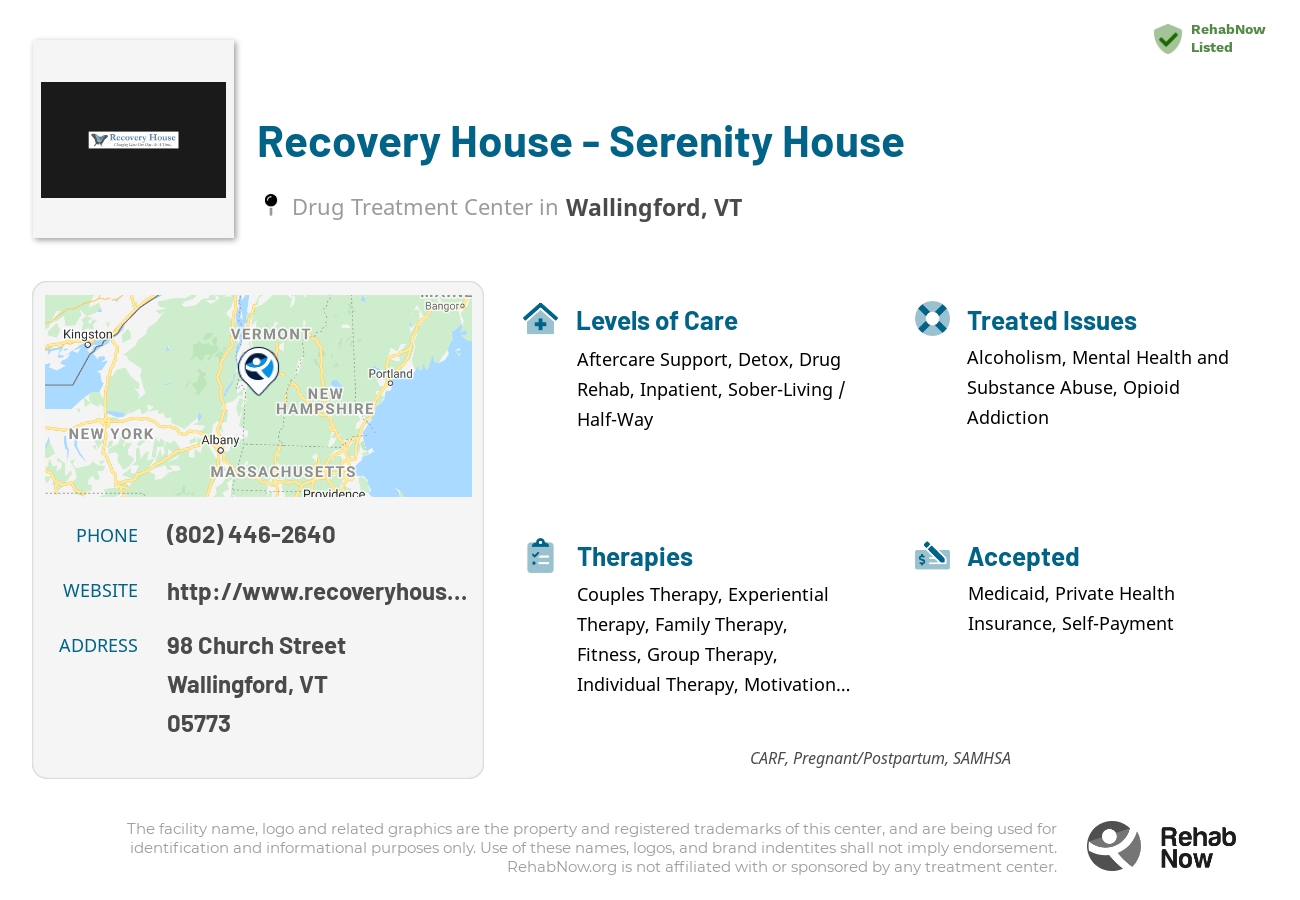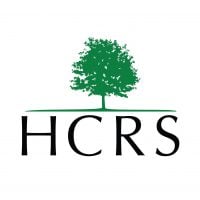Recovery House - Serenity House
Drug Rehab Center in Wallingford, Vermont
Recovery House - Serenity House in Wallingford, VT provides comprehensive addiction treatment services, including detoxification, inpatient, residential, and sober-living/half-way care, as well as aftercare support and access to various resources for maintaining sobriety.
About Recovery House - Serenity House in Vermont
Serenity House, located in Wallingford, VT, is a private, non-profit residential treatment center for substance abuse. This facility, part of Recovery House, Inc., offers 24 beds for both men and women, committed to treating addiction as a treatable, chronic disease. It stands out with its person-centered approach and emphasis on community-based support alongside treatment.
Accredited by the Joint Commission and licensed by the state of Vermont, Serenity House adheres to the highest standards of care in addiction therapy. With certifications from SAMHSA and CARF, it employs evidence-based, individualized treatment plans, and encourages participation in 12-step groups.
- Offers a comprehensive, residential treatment with 24-hour medical and therapeutic support.
- Engages patients in evidence-based therapies, including cognitive-behavioral therapy and trauma-informed care.
- Provides holistic therapies and medication management as integral parts of its treatment services.
Serenity House addresses a range of addictions and substance abuse issues, utilizing a variety of treatment methods such as individual and group counseling, and various levels of care, ensuring each client's journey towards sobriety is both supported and sustainable.
Genders
Ages
Modality
Additional
Accreditations
State License
SAMHSA

CARF
The Commission on Accreditation of Rehabilitation Facilities (CARF) is a non-profit organization that specifically accredits rehab organizations. Founded in 1966, CARF's, mission is to help service providers like rehab facilities maintain high standards of care.
Conditions and Issues Treated
With so many people addicted to opioids, we need to help those who want to quit. The cycle begins when opioid addicts take opioids for a painful injury. When someone starts taking their medication differently or in excess, it means they’re addicted and at risk of overdosing.
In , detoxing from these types of treatments is the most effective way to beat this. Most facilities begin with medical assistance and then provide counseling services; rehabilitation follows after successful treatment.
Levels of Care Offered
This center offers a variety of custom treatment tailored to individual recovery. Currently available are Aftercare Support, Detox, Drug Rehab, Inpatient, Residential, Sober-Living / Half-Way, with additional therapies available as listed below.
Detox is an integral part of recovery and often very hard. Detoxification is the process of letting the body remove the drugs in it. It addresses the physical aspect of addiction. Detox from drugs can be unsafe as the patient undergoes withdrawal symptoms that range from headaches, vomiting, body aches to seizures and cardiac arrests. The main purpose of detox is to keep the drug users comfortable as the drugs leave their system.
Quitting cold turkey is not recommended and can lead to many issues. Detox is best done under medical supervision so that a team of experts can monitor the side effects and complications. Detox, alone, does not guarantee sobriety as the underlying psychological issues are not addressed.
Inpatient treatment is a form of recovery used in drug rehab. Inpatient recovery offers individual therapy, groups, and family therapy to ensure that the addict has the best recovery possible. A variety of treatments are provided in this type of recovery, depending on what treatment the addict needs at that particular time.
The length of inpatient addiction treatment depends on the addict and their addiction. Inpatient rehabilitation can last anywhere from 30 days to 90 days, depending on how severe the drug abuse is. Inpatient rehab is a costly drug treatment, costing anywhere from $30k- to $60k. However, insurance often offers help in covering these costs.
Sober living homes, offered by rehabilitation facilities, help recovering addicts transition back into society. These homes have rules and regulations that must be followed to maintain sobriety. They also provide resources such as vocational training and therapy sessions.
Residential treatment programs are those that offer housing and meals in addition to substance abuse treatment. Rehab facilities that offer residential treatment allow patients to focus solely on recovery, in an environment totally separate from their lives. Some rehab centers specialize in short-term residential treatment (a few days to a week or two), while others solely provide treatment on a long-term basis (several weeks to months). Some offer both, and tailor treatment to the patient’s individual requirements.
The accomplishment of completing a drug or alcohol treatment program is just the first step. Once that is complete, aftercare support comes into play. This includes helping people adjust to life without substances outside of guidelines with assistance like getting sober living accommodations and career counseling and AA/NA programs for those who are struggling between sobriety or want continued help in maintaining it once they have completed their initial rehabilitation at an addiction facility.
Aftercare comprises services that help recovering addicts readjust to normal day-to-day activities while working on specific issues. These problems include psychiatric issues, family problems caused by substance abuse, continuing education pursuits if desired during rehab, etc. These can last up to one year+ depending on what’s needed most urgently upon completion of earlier stages.
Therapies & Programs
Different people react differently to various treatment options. Some drug rehabilitation centers offer individualized treatment that caters to the specific needs of a drug addict. The best treatment option varies on an individual depending on the type of drug abused, life history, medical condition of the person, social circumstances, and the environment they live in now.
When a person enters drug rehab, they usually have anti-drug associations such as withdrawal symptoms, stress, cravings, etc. The first step of drug rehab is to detoxify the body from any residual substances in it. Drug rehabilitation centers usually employ trained medical professionals to help in this process. Usually, the initial detoxification lasts for five days, where the person is monitored under close supervision.
Couples therapy is a treatment method used to help couples in which at least one member of the couple has a drug addiction. The treatment is designed to help the couple strengthen their relationship to minimize the effects of drug addiction on their lives and promote healthy communication between them.
Couples therapy can be used whether the addicted partner is using drugs or in recovery. It helps the couple create healthy communication and coping skills to minimize the problem-solving abilities of one partner, which can then be directed at solving issues related to their addiction. It also helps couples address problems that may be related to drug addiction. Couples therapy can help couples feel like a team and not feel like their partner is the problem.
Couples therapy is very challenging for both the drug addict and their partner. It requires an intense commitment between the two individuals to participate in the sessions and the homework assigned between sessions.
An additional benefit of couples therapy is that it can help make other types of treatment, such as 12-step programs, more effective.
Family therapy sessions typically involve the addict and their family members. During these sessions, a therapist will work with everyone involved to help them understand addiction and find healthy ways of coping without substance abuse.
Some addicts might feel embarrassed about their substance abuse problems. By encouraging family members to attend these sessions, therapists can show addicts that they’re not alone in dealing with addiction. Therapists can also work with family members to help them understand addiction and learn how to offer support and encouragement to their loved one as they deal with substance abuse issues.
Attending group therapy at Recovery House - Serenity House in , is a useful way for those seeking sobriety to realize they aren’t the only one going through it.
This is when a group of people on different recovery phases get together and talk about what they’re going through, their triggers, successes, and failures. This can include alternative types of therapies too! Group therapy may occur on an outpatient or inpatient basis with groups that have no pre-existing relationships outside the session, unlike support groups where everyone already knows each other beforehand.
Cognitive Behavioral Therapy is a type of psychotherapy that helps people address the thoughts and behaviors that may have led to their addiction. It also helps change negative thoughts into positive ones and promotes healthy communication between addicts and those around them. CBT is an efficient treatment for individuals suffering from all sorts of addictions.
Cognitive Behavioral Therapy (CBT) focuses on the underlying thoughts and behaviors that caused the problem of addiction in the first place and may cause a relapse. Negative feelings are common in drug abuse disorders, but they can lead to co-occurring disorders if not recognized. CBT involves strategies that help to change the behavior pattern by restructuring negative thoughts into positive ones. It helps to remove these feelings, and it provides long-term benefits. Also, CBT promotes self-awareness, self-control and can be administered as a mono-therapy or as part of combination therapy.
The use of Rational Emotional Behavior Therapy for addicts has been shown to have positive and desirable outcomes. It is a form of specific counseling that replaces negative and self-limiting thoughts with positive and productive behaviors. Self-defeating thoughts and habits can limit your possible successes. Some examples of this are procrastination, unhealthy eating, and angry outbursts. You may not be aware that some unhealthy behaviors and thoughts are sabotaging your potential accomplishments.
Patient Experience
Experiential Therapy at Recovery House - Serenity House
Experiential therapy is a type of therapeutic approach that focuses on having patients work through problems, issues, or emotions by engaging directly in some real experience. It occurs face-to-face with a therapist who helps these people to explore their feelings first hand. The hope is that when this happens, the patient will feel driven to turn away from their destructive behavior and instead take up positive behaviors or coping mechanisms. Direct experience methods, role play, psychodrama, interpersonal and social learning are a few different forms of experiential therapy.
Fitness Therapy
To recover from addiction, one needs to recover the body and mind. Addiction can harm your health in many ways. Learning how to take care of yourself includes physical fitness. Exercise releases feel-good hormones and further contributes to positive self-esteem. Self-discipline can be practiced through an exercise regimen as you learn how to take care of yourself. Studies have shown that exercise increases abstinence rates, ease withdrawal symptoms and improve depressive symptoms for those in Wallingford, VT.
Payment Options Accepted
For specific insurance or payment methods please contact us.
Is your insurance accepted?
Ask an expert, call (888) 674-0062
Additional Details
Specifics, location, and helpful extra information.
Wallingford, Vermont 5773 Phone Number(802) 446-2640 Meta DetailsUpdated April 15, 2024
Staff Verified
Recovery House - Serenity House Patient Reviews
There are no reviews yet. Be the first one to write one.
Wallingford, Vermont Addiction Information
Vermont has the highest rate of illicit drug abuse in the nation. A third of all Vermonters who are addicted to drugs admit to first having abused prescription drugs. The largest drug threat in Vermont is opioids. Fentanyl, dubbed the most dangerous drug in America, is responsible for more than half of all opioid-related deaths in Vermont. A third of all residents aged 12 and older who are addicted to drugs admit to first having abused prescription drugs. In many overdose cases, cocaine is also a contributing factor.
Treatment in Nearby Cities
- Williamstown, VT (50.1 mi.)
- Bradford, VT (55.8 mi.)
- Manchester Center, VT (21.6 mi.)
- Worcester, VT (66.1 mi.)
- Bradford, VT (55.8 mi.)
Centers near Recovery House - Serenity House
The facility name, logo and brand are the property and registered trademarks of Recovery House - Serenity House, and are being used for identification and informational purposes only. Use of these names, logos and brands shall not imply endorsement. RehabNow.org is not affiliated with or sponsored by Recovery House - Serenity House.












